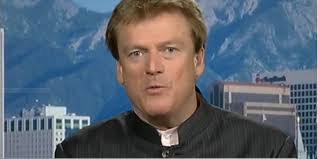“…the most falsely over-weighted topic on Wall Street these days is naked shorting…the concept of not finding shares before you short them, not locating them, is something that happens very rarely…”
– Jim Cramer, TheStreet.com, February 5, 2006
Do you believe in redemption?
In “The Story of Deep Capture,” we noted that CNBC’s Jim Cramer is at the center of a clique of dishonest journalists (most of them former employees of Cramer’s website, TheStreet.com) who have spent many years taking dictation for short selling hedge funds (most of them connected to Cramer). These same journalists, we pointed out, have steadfastly denied that hedge funds commit crimes or that illegal naked short selling is a big problem.
On the day after we published “The Story of Deep Capture,” Cramer went on CNBC to say that illegal naked short selling is a big problem.
This was the first time he had ever said such a thing, and he didn’t mince words. Comparing today’s hedge fund crimes to the short selling that contributed to the great stock market crash of 1929, he said, “We know that there was a lot of time spent in the 30s analyzing this issue and deciding that it was very easy to create a bear raid…What I’m trying to eliminate is the kind of bear raid…where people didn’t borrow stock [i.e., where they conducted illegal naked short-selling].”
Cramer was quiet on the issue after that. But last week, the SEC issued an “emergency order” suggesting that naked short-selling had the potential to topple the American financial system.
That evening, Cramer said, for the second time in his career, that naked short selling is a big problem. He said that, in fact, all along, “We’ve been on a crusade on this show…it’s a crusade to bring back honest short-sellers…Right now hedge funds, if they don’t like a stock, can just attack it by calling brokers and punishing the stocks, blitzing them down [by selling stock that they have not borrowed – naked short-selling].”
Meanwhile, the rest of the CNBC staff went to lengths to suggest that short-sellers are good people who do no wrong – that the SEC’s emergency order was some kind of witch hunt. The folks at CNBC also seemed keen to erase their own culpability in the short-seller attack that is widely believed to have destroyed Bear Stearns.
Strangely, Charlie Gasparino, who has been one of the few CNBC reporters to acknowledge short-seller shenanigans (he once called Deep Capture reporter Patrick Byrne a “hero” for raising awareness of the problem), suddenly pronounced that people who believe that short-sellers destroyed Bear Stearns are all “morons” because hedge funds were pulling their money out of the bank “before all the CNBC chatter” [i.e., before CNBC’s David Faber sparked a panic by airing, as if it were fact, the scurrilous hedge fund lie that Goldman Sachs had cut off Bear’s credit].
This was somewhat in contradiction to Gasparino’s earlier suggestion that hedge funds had precipitated the demise of Bear Stearns. “If you look at the way Bear Stearns imploded,” he said in April, “it didn’t go down in a couple of months, it went down in a week. And if you look at what happened, it’s clients, which were hedge funds – these are the people that…trade with the firm. They precipitously started pulling cash while – while they were going short…”
Indeed, we challenge CNBC to name more than one hedge fund that had pulled out its cash before its reporter, David Faber, aired that well-timed fabrication on Wednesday, March 12 . We’ll say it again: The SEC should subpoena Faber to find out which hedge fund (perhaps illegally) fed him the false news.
In any case, Gasparino now says critics of short-sellers are “morons.” The rest of CNBC has not seen fit to interview the many experts who believe illegal naked short selling is threatening the stability of the American financial system, and has instead lined up people like Cramer pal Joe Nocera, of the New York Times, and Michael Steinhardt, the hedge fund manager who incubated Cramer’s first hedge fund. These people have reinforced the party line that short-sellers are the market’s “vital” untouchables while failing to address the data – the billions of phantom shares that crooked hedge funds have manufactured through naked short selling.
Thus, surreally, the only person on CNBC now acknowledging the scope of the problem is the one journalist who has done the most to cover it up – Jim Cramer. And Cramer is not just acknowledging the problem, he’s telling us how angry it makes him. I mean, we at Deep Capture have done our fair share of ranting about naked short selling, but our efforts pale in comparison to the 15-minute tirade that Jim Cramer launched against the SEC for failing to stop the law-breaking short sellers who are “viciously and quickly” driving down stock prices [tirade accompanied, literally, by a soundtrack of emergency sirens].
What to make of this?
We’ve given up trying to psychoanalyze the singular Jim Cramer. Maybe he sees where the wind is blowing and is trying to distance himself from his hedge fund cronies. Maybe CNBC has heard the critics who have been hollering for years that Cramer’s clique was running rampant, while Gasparino was the only reporter on CNBC who could be objective about short-sellers’ crimes. Maybe to neutralize that criticism, CNBC is flipping everything on its head. We’ve seen stranger goings-on at Cirque du CNBC.
But it doesn’t matter. We’d like to give Jim Cramer a hug. Yes, Jim, come on over — you bear, you — and give us a great big hug.
There is always the possibility that you are legitimately horrified by the destruction that illegal short-selling has wrought. Maybe you even feel a bit guilty about the role you have played.
Well, we feel your pain. All is forgiven. Come and give us that hug.
Sure, it’s beyond the pale for you to suggest that you’ve been on our “crusade” all along, but we’ll give you points for chutzpah. We’ll also give you points for taking a stance that will no doubt alienate you from some of your closest friends.
Most importantly, we give you points for speaking the truth – and doing it well. Although your speechifying against the problem of illegal naked short selling seems strangely timed, it has been unequivocal, incisive, and no doubt convincing to a great many people.
“Would you call me crazy?” you asked on CNBC, as a prelude to your 15 minute rant against the naked short selling problem. Yes, Jim, we would — but crazy ain’t such a bad thing to be, so long as you’re saying it like it is, and doing the world good.
Welcome to the Deep Capture team.
(Or….maybe not. Here’s a question for the long-time crusaders – the hundreds of good people who have been hollering about the problem of naked short-selling for years (you’re all members of the Deep Capture team, as far as we’re concerned): Do you believe that Cramer is truly reformed? Is he going to continue highlighting short-seller crimes. Can he really be one of us? Let us know what you think).





Criminal short-selling seemed to be ok with Cramer in an up market where stocks could be driven down for large gains. It was ok for a few select parties who used the media in the game. When the extent of the fails grew beyond redemption, Cramer saw that it could break the system. In a last ditch effort to to stop the criminals from destroying the market, from which Cramer makes his living, he decided to come clean. Cramer, etal lied to the public about the criminal enterprise and now he can’t get traction because of the previous lies.
Every corner of the market is corrupt, the regulators, the traders, the brokers, the rules, the media.. the products that they have been selling as real when they are not. Fraud.. total fraud. Cramer has to reinvent himself or he will be found part of the criminal enterprise.
Regulator being investigated… it is about time.
from http://www.investigatethesec.com
“By Amit R. Paley
Washington Post Foreign Service
Wednesday, October 22, 2008; Page D03
Senate investigators are looking into whether senior officials at the Securities and Exchange Commission provided confidential information to former colleagues working on Wall Street.
The inquiry began after the SEC’s Inspector General received an anonymous tip earlier this month. It alleged that Linda Chatman Thomsen, the agency’s director of enforcement, gave information about investigations into Bear Stearns around March to the general counsel of J.P. Morgan Chase, which at the time was considering whether to buy the troubled investment bank. The Oct. 7 complaint claimed that the inside knowledge obtained by the attorney, Stephen M. Cutler, a former head of enforcement at the SEC, allowed J.P. Morgan to low-ball its bid to purchase Bear Stearns.
A copy of the complaint was also provided to Sen. Charles E. Grassley (R-Iowa), the ranking member on the Senate Finance Committee.
In a letter sent last night to the SEC, Grassley asked for information about all SEC investigations into Bear Stearns, as well as communications between SEC officials and J.P. Morgan Chase about those cases.
“Such conduct would reinforce the appearance that Enforcement decisions, and disclosures of information about them, are sometimes based not on the merits,” he wrote in his letter yesterday, “but rather on access to senior officials by influential representatives of power brokers on Wall Street.”
An SEC spokesman declined to comment last night. J.P. Morgan Chase did not respond to a request for comment last night.
The inspector general, H. David Kotz, issued a report last month that criticized what some agency employees called the “common practice” of outside lawyers gaining access to senior SEC officials. He also said the agency should consider disciplining Thomsen for such behavior while she was in charge of an insider-trading case.
Grassley raised concerns last year about improper communications between high-level SEC officials and attorneys at firms under investigation.”